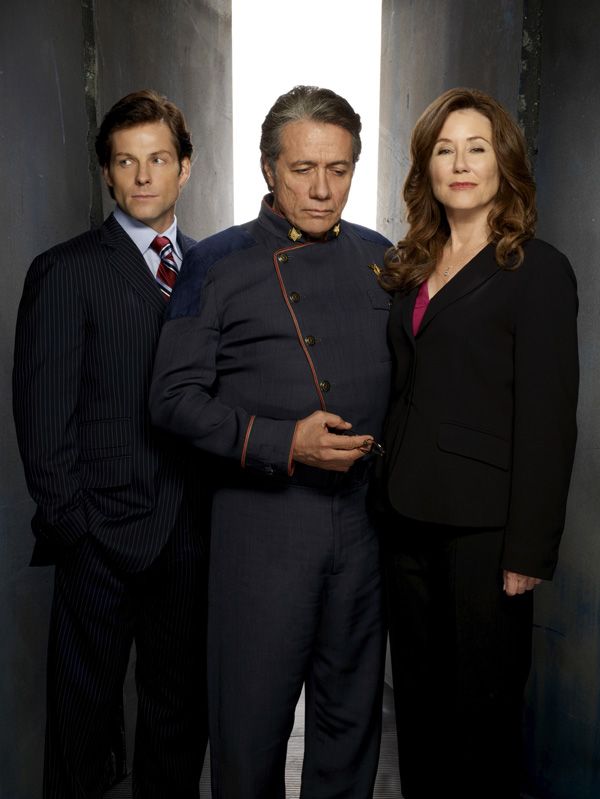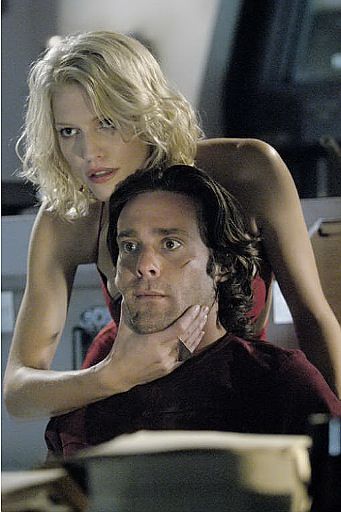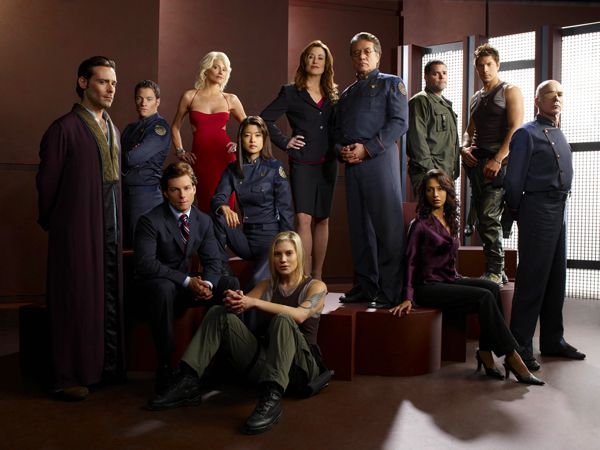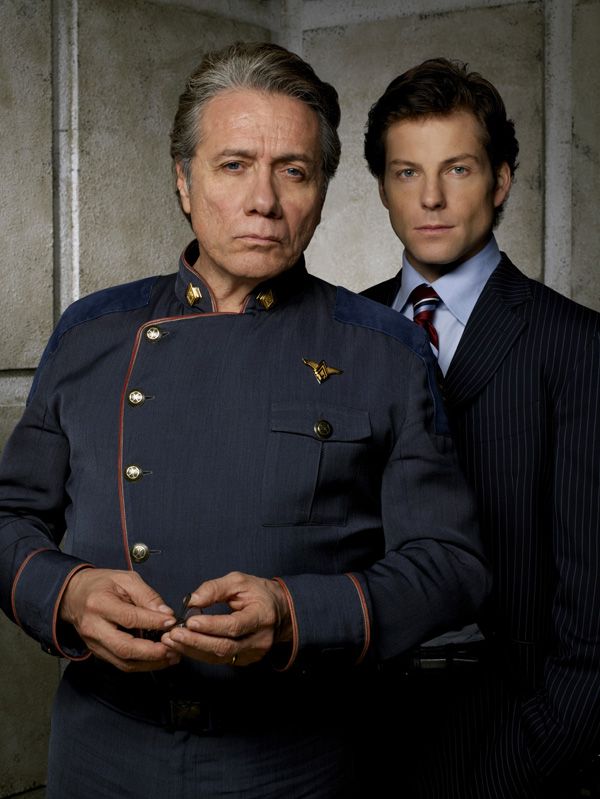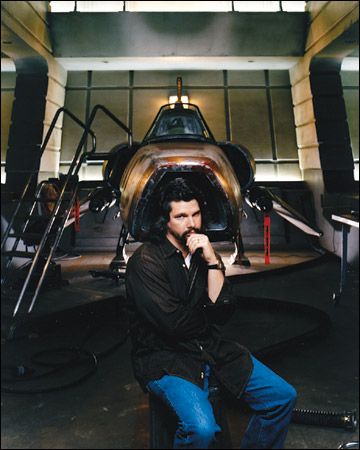"Battlestar Galactica" alumni and representatives of the United Nations spoke to a crowd of press and fans last Thursday at the Mann's Chinese Theater in Los Angeles. The presentation, entitled "Battlestar Galactica: TV's Role In Making Global Issues Relevant" was hosted by The Los Angeles Times - The Envelope, a section of the paper focusing on entertainment news. The presentation itself was a follow-up to a similar event held at the United Nations headquarters in New York last year, highlighting Battlestar Galactica's dramatic work on issues relevant to global concerns. But the event served a second purpose: coaxing The Academy to keep mindful of the acclaimed series' four season run with The Emmys fast approaching.
The panel featured Ronald D. Moore (creator, executive producer), David Eick (executive producer), Mary MacDonald (President Rosalyn), Edward James Olmos (Admiral Adama) and Craig C. Mokhiber (Deputy Director, New York Office of the High Commissioner for Human Rights). The panel was hosted by The Los Angeles Time's Geoff Boucher, entertainment critic, blogger and avid "Battlestar Galactica" fan.
After the jump is a detailed write-up of what happened.
The presentation began with video from the series. Boucher then asked Mokhiber why The United Nations chose to honor "Battlestar Galactica". Mokhiber explained that it was the show's focus on human rights issues that made it television relevant to the United Nation's mission statement. "Basically, the show owes us royalties," Mokhiber joked. "The U.N. was founded with a very specific goal - to ensure freedom from fear and freedom from want. When I think of Battlestar Galactica, those are the two re-emergent themes. And those are the issues we deal with every day."
Mokhiber went on to say that the show was especially relevant in light of the current debate over torture. "One of the things the show was constantly dealing with is this idea of moral relativism or moral exceptionalism," Mokhiber explained.
"From the outset, one of the things that David and I wanted was a show with relevance," Moore agreed. "I tried very hard not to make this show a platform for attacking the Bush administration. We wanted to examine every issue from both sides. To take that quote from Lincoln 'with charity for all and malice for none' and make it what the show was about."
However, while the show's creators set out to make "Battlestar Galactica" relevant, they tried hard not to create a show that would feel dated or topical. "We didn't want to rip our stories from the headlines," Eick stressed. Rather, the show's staff of writers would focus on finding human themes in military conflict that were universal.
That the United Nations was now honoring the show for these themes was a source of pleasant astonishment to Eick. "The themes that people are talking about were dreamed up in Sports Bars," he admitted.
"We do our best negotiating in Sports Bars, actually," Mokhiber joked.
Moore admitted that while the writers tried hard not to pull stories from the newspaper, the essence of the show was born out of 9/11. "There's a sickness and a darkness to the characters in Battlestar Galactica that... if the show had happened ten years later, it never would have made it on the air," he admitted.
Olmos agreed. "As I would watch it, I would say - wow, this is not healthy for anyone to see. Because we really don't want to know this about ourselves. But it's the same thing that made the U.N. say 'thanks guys'."
Mokhiber explained just why the United Nations felt the need to give the show its' gratitude. "We feed ninety million people around the world in several different countries," he said. "We lead the charge against cholera, small pox... the U.N. has a presence and it has a depth and we've always had a hard time communicating that."
To Mokhiber, "Battlestar Galactica" expressed the themes of human rights issues better than the United Nations.
One example Mokhiber cited was the trial of Gaius Baltar, one of the series' more popular characters. "We all feel the need for justice and we all feel the need for vengeance... and telling the two apart is difficult sometimes," Lee Adama declares in the season three episode "Crossroads, Part 2". The line strikes at the heart of war crimes tribunals throughout recent history.
"This is something that we face quite often in our work," Mokhiber admitted. "If everyone is accountable, how is it that you purge the guilt?"
"What can those here do?" Boucher asked, gesturing toward the audience. He took one answer from each member of the panel.
"There's no shortage of human rights groups," Mokhiber answered. "Amnesty International, Human Rights Watch, they do fantastic work. But I think the important thing is to find out what the heck is going on."
"Realize that... it matters who I vote for, it matters who I give my money to," Moore urged.
"Information is the key," Olmos agreed. "But the problem is... it's hard to get honest information. We're human and we love to put in our own sense of... being, in everything we touch."
"The U.N. is a club of nations and here's where I get fired," Mokhibar said, speaking frankly. "I've often thought that if most people knew the stances their own countries take on human rights issues inside the U.N., the disappointing declarations, they would be... surprised. There's a hundred and ninety two countries inside the U.N. and every one of those Governments violates human rights."
Eick had a simpler answer. "I think we just have to... find somebody to beat the Hell out of Glenn Beck," he joked.
The panel then showed footage from and spoke briefly about "Battlestar Galactica: The Plan," the SciFi channel original film which will constitute the last hurrah for the series. "The Plan" is the story of the destruction of the colonies and the resulting four seasons from the point of view of the Cylons.
"What you have done with this movie is brilliant!" Olmos declared. "I never would have thought once we finished the series that we would go back to the beginning and see it all differently." Olmos then went on to praise the writer of the film, Jane Espenson. "You're going to want to go back and watch all your DVDs again!" He promised.
"You'll want to buy them a second time though," Eick joked.
"You may have to buy it two or three times," Moore said finally, to laughter and applause.


